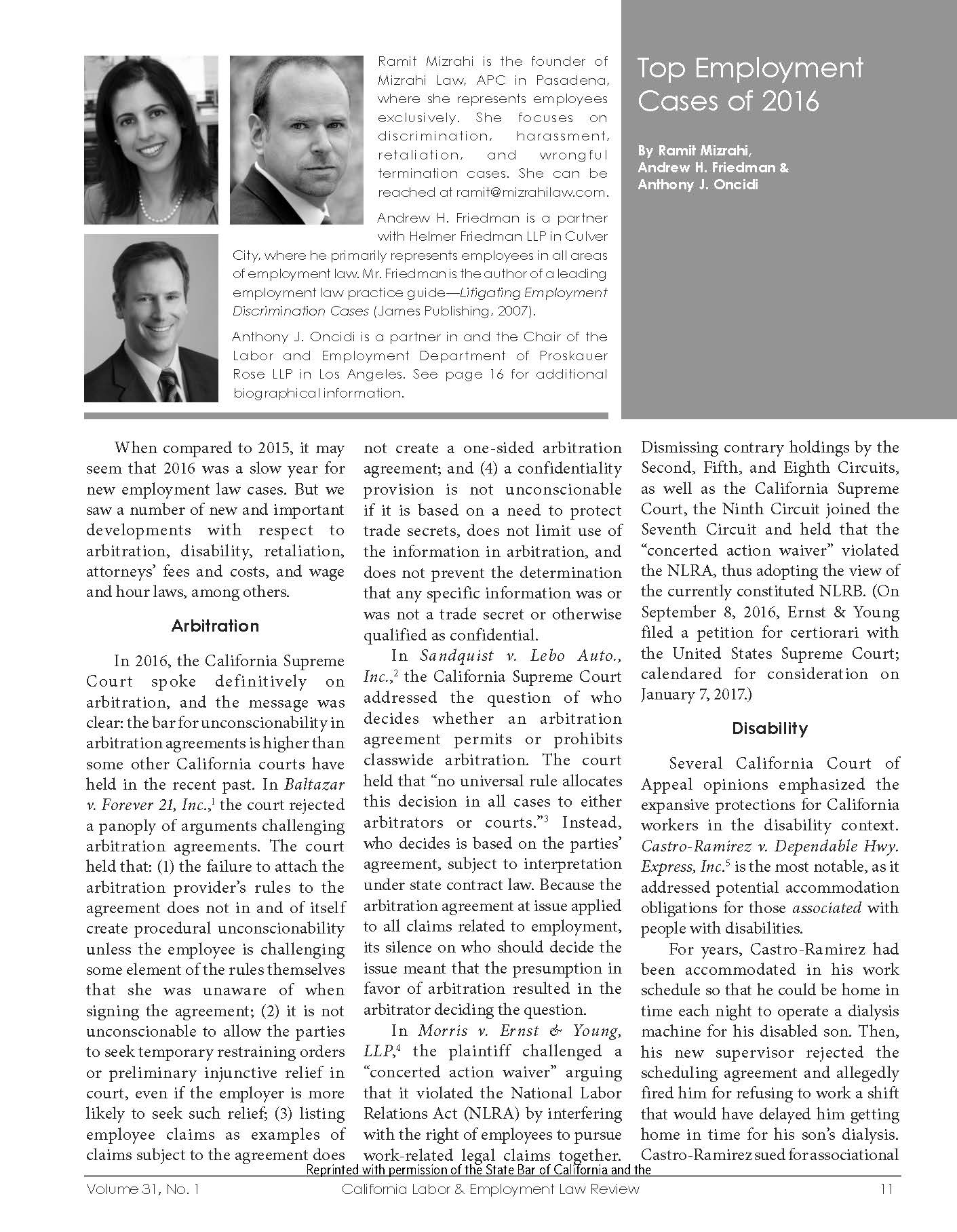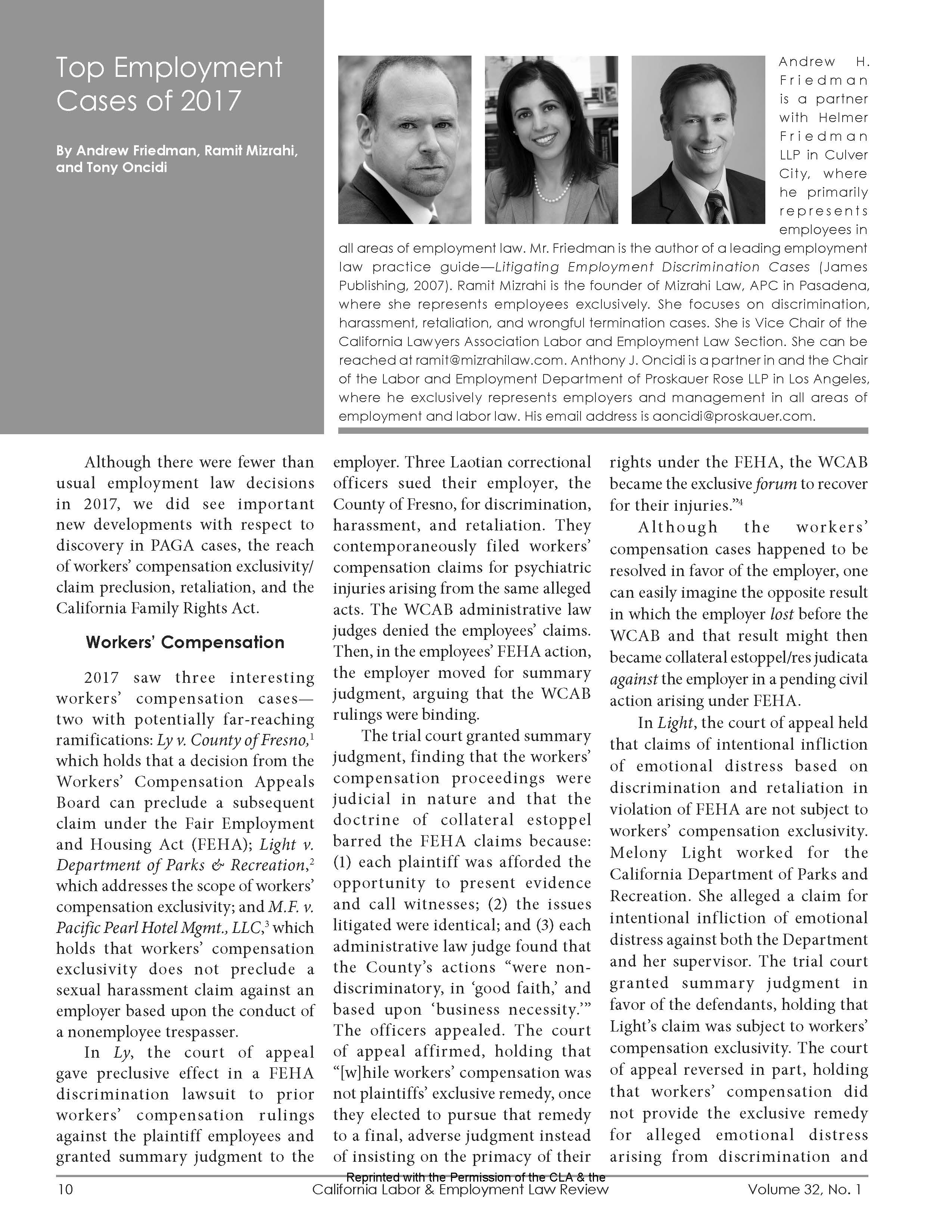-
The January 2018 issue of the California Lawyers Association’s Labor & Employment Law Review features an article authored by Andrew Friedman, Ramit Mizrahi, and Tony Oncidi.
The article—”The Top Employment Cases of 2017″— highlights the most important California state and federal employment cases from last year. Click on the below image to read the article in full.
-

On March 1, 2018, Ramit Mizrahi will be presenting at the California Lawyers Association’s Employment Law 101 conference. The conference is designed to teach fundamentals to lawyers new to employment law. She will be presenting on two panels: harassment, discrimination & retaliation (9-10:30 a.m.) and leave law compliance (1:15-2:45 p.m.).
Date and time: March 1, 2018, 9 a.m.– 4:30 p.m.
Location: The State Bar of California, 845 S. Figueroa St., Los Angeles, CA 90017.
-

On December 22, Ramit Mizrahi appeared on AirTalk (hosted by Larry Mantle) at KPCC to discuss how companies are using Facebook to target ads to younger employees, and how this can run afoul of anti-discrimination laws.The episode can be found here: Age discrimination lawsuit against big employers exposes snag in Facebook’s targeted ad system.
More Of Ramit’s Thoughts On Why Targeted Job Ads Are So Troubling
Gone are the days when people would get the local paper to scope out job ads. These days, most jobs are posted online. While there are dedicated job sites like Monster or CareerBuilder, employers are increasingly posting on Facebook.
There are many benefits to using Facebook to post jobs ads. Many potential employees are not on LinkedIn and do not have résumés posted online. Facebook has nearly 2 billion users who can be reached, including people who may not be looking to change their job situation but may be enticed to make a change. In addition, employers have the ability to microtarget, limiting their ads to people with specific interests or experience, enabling them to seek out the employees they believe will be most suitable for jobs.
Targeting Job Ads By Age Can Be Devastating to Older Workers
The problem is that employers can target ads to viewers not only by interests but also by protected characteristics, including age and gender. Working in collaboration, Propublica and the New York Times revealed that dozens of large companies–including Verizon, Amazon, UPS, and even Facebook itself–were posting job ads on Facebook that were visible only to those in certain age ranges (to give some examples, 18-24, 25-36, 27-40, and 25 to 60).
Such a practice makes job postings invisible to older workers. This means that they may never
-

On October 21, 2017, Ramit Mizrahi will once again be speaking about the year’s most important employment law cases. The panel will be part of the California Employment Lawyers Association’s 30th Annual Employment Law Conference. She will be speaking alongside Andrew H. Friedman of Helmer Friedman, LLP.
Date and time: October 21, 2017, 10 a.m.–12:05 p.m.
Location: Oakland Marriott City Center
Additional information can be found on the CELA events page.
-

Mizrahi Law is pleased to announce that founder Ramit Mizrahi has been selected for two highly prestigious lists:
- Super Lawyers® Up-and-Coming 100: Southern California Rising Stars 2017, and
- Super Lawyers® Up-and-Coming 50: Women Southern California Rising Stars 2017.

This is the third year that Super Lawyers has identified its most highly rated Rising Stars on top 50 and top 100 lists.
This also marks the fifth year that Ramit Mizrahi was selected a Super Lawyers® Southern California Rising Star. Only the top 2.5% of eligible attorneys in Southern California are selected as Super Lawyers Rising Stars, reflecting peer recognition of excellence in practice. Ms. Mizrahi was selected in the area of Employment Law (Plaintiff side), recognizing her commitment to helping employees.
Ms. Mizrahi’s selection as one of the top 100 Rising Stars and top 50 Rising Stars women–already a highly select group of attorneys–reflects that she is highly respected among her peers and is one of the top-rated attorneys in Southern California.
Ms. Mizrahi remains committed to serving as a tenacious advocate for her clients while working to build collegiality and community in the legal profession.
-

On June 20, 2017, Ramit Mizrahi will be speaking about mediating discrimination cases. The panel, titled “Mediating Employment Discrimination Cases in Changing Times,” will be presented at the Southern California Mediation Association’s 2017 Employment Mediation Institute.
Date and time: Tuesday, June 20, 2017, 6-9 p.m.
Description:
Have you found yourself thinking lately, “Wow, the world is changing at a rapid pace and I don’t know what will happen next?” Just as we have seen significant changes in the political and social realms, the field of employment law is rapidly evolving. State laws have taken on a greater importance, including with respect to protections for LGBT employees and undocumented employees. Additionally, long-standing rules have been construed in recent years to expand the scope of protected activity and protection against retaliation. There is much uncertainty ahead.
Please join our panel as they discuss the evolving employment law landscape, along with the practical implications and application for practitioners and mediators. Each of the panel members are at the forefront of handling cutting edge employment and labor law matters and will share their expertise, insights, and predictions for the world of employment law to come.
It promises to be a great evening!Location: Pepperdine University West LA Campus, Pepperdine University Plaza, 6100 Center Drive, Los Angeles, CA 90045.
Tickets are available here.
-

On March 8, 2017, Ramit Mizrahi will be speaking about the summary judgment cases that every California employment lawyer should know. The panel, titled “The 50 Cases You Need to Know to Obtain and Oppose Summary Judgment,” will be part of the Los Angeles County Bar Association’s 37th Annual Labor & Employment Law Symposium.
Date and time: Wednesday, March 8, 2017, 10-11 a.m.
Description: Learn the top 50 cases you need to know in preparing and opposing motions for summary adjudication and/or summary judgment in major areas of employment law, including claims of harassment and discrimination based on race, gender, age, disability and claims of retaliation.
Location: Millennium Biltmore Hotel Los Angeles, 506 S Grand Ave, Los Angeles, CA
Tickets are available here.
-

On March 1, 2017, Ramit Mizrahi will be speaking about returning to work from long medical leaves. The panel will be part of the Employment Round Table of Southern California’s 2017 Legal Update and Important Legal Issues seminar. The panel is titled “‘I’m Finally Ready!’: When Employees Return to Work After Long Medical Leaves.” Ms. Mizrahi will be speaking alongside Tina Walker (Regional Administrator, Department of Fair Employment and Housing) and Elisabeth Lilly (Senior Counsel, Northrop Grumman Corp.).
Date and time: Wednesday, March 1, 2017, 10 a.m.
Description: The California Family Rights Act and the ADA provide employees with a bridge back to work – or is it more like a highway? Employees on medical leaves are often released to return to work long after they have exceeded their job protections under federal and state law. These employees may have medical limitations or need work accommodations. Their old job may or may not be available, and they may or may not be able to perform essential job functions. Our panel will discuss the issues associated with such returns to work. Tina Walker (Regional Administrator, DFEH Los Angeles Regional Office) will speak from a government perspective, Elisabeth Lilly, Esq. (Senior Counsel, Northrop Grumman Corp.) from that of the employer, and Ramit Mizrahi, Esq. (Founder, Mizrahi Law, APC) from that of returning employees.
Location: Loyola Law School Fritz B. Burns Lounge, 919 Albany St., Los Angeles, CA 90015
Tickets are available here.
-
This month’s issue of the California Labor & Employment Law Review features an article authored by Ramit Mizrahi, Andrew Friedman, and Tony Oncidi. The Law Review is an official publication of the State Bar of California’s Labor & Employment Law Section. The article—”The Top Employment Cases of 2016″—highlights the most important California and Supreme Court employment cases from last year. Click on the below image to read the article in full.

-

Given the election outcome, there is much uncertainty about the what the future holds for our country. Workers have many reasons to be concerned, particularly given that our President-elect will likely appoint and nominate people hostile to workers’ rights and civil rights to government positions, including to the Equal Employment Opportunity Commission, the National Labor Relations Board, and the Supreme Court.
Fortunately, we in California are to some extent shielded from changes in federal laws in situations where there are California laws in effect that offer similar or broader protections. To give some examples:
- A California employee can usually sue for discrimination, harassment, or retaliation based on sex, race, and certain other protected categories under either the California Fair Employment and Housing Act (“FEHA”) or under Title VII of the Civil Rights Act of 1964 (“Title VII”). The FEHA covers employers with five or more employees for discrimination and retaliation, and one or more employees for harassment, and also allows individual harassers to be sued personally. Title VII applies to employers with fifteen or more employees and does not allow for individual liability. Title VII also contains caps on compensatory and punitive damages based on the size of the employer, while the FEHA has no such limitations.
- The FEHA explicitly prohibits discrimination based on “gender, gender identity, gender expression” and “sexual orientation,” while Title VII does not. The EEOC and a number of federal courts have taken the (logical and just) position that sexual orientation discrimination is a subset of sex discrimination and therefore prohibited under Title VII (as is discrimination against LGBT individuals in general), but there is a risk that with a change in the composition of the federal courts, we could regress in interpretations of federal law. Regardless, LGBT workers in California will remain protected.
- The FEHA and the Americans with Disabilities Act (“ADA”) offer similar protections with respect to disability discrimination. The FEHA is more protective of disabled employees and explicitly states that the ADA serves only as a “floor.”
- The California Family Rights Act (“CFRA”) and the Family and Medical Leave Act (“FMLA”) are two leave laws that have significant overlap in their coverage and protections. Again, CFRA offers more protections to California employees, particularly pregnant women who also take pregnancy disability leave.
- California’s Labor Code contains a number of protections regarding minimum wages, overtime pay, recordkeeping, and other employee protections, as does the Fair Labor Standards Act (“FLSA”). The California laws tend to be more protective (for example, providing that most non-exempt employees receive overtime for for all hours over 8 worked in a day, not just for all hours over 40 per week, and also requiring that employees receive meal and rest breaks).
- California has a number of laws that protect whistleblowers, including Labor Code section 1102.5 (a broad statute that protects all types of whistleblowing), Labor Code section 6310 (protecting employees who complain about workplace health and safety issues), and Health and Safety Code section 1278.5 (protecting employees who complain about patient health and safety issues). There are some overlaps with federal whistleblower laws.
As the previous paragraph demonstrates, our laws tend to offers greater protections and additional remedies as compared to federal employment laws. For that reason, most California employees choose to sue under the California laws when possible. In addition, asserting California (and not federal) claims allows employees to file and usually to keep their cases in state courts. There, an employee need only convince nine out of twelve jurors to find in his favor in order to win his case, in contrast to the requirement in federal court that the jury find for him unanimously. Judges in state court are also less likely to grant summary judgment and dismiss employees’ cases, and tend to give lawyers more time to try their cases.
We are fortunate to live where we do. The newly enacted Labor Code section 925 will ensure that employers cannot strip California employees of their substantive rights or force them to litigate/arbitrate their claims in out-of-state forums. Even if the courts and the nominees/appointees of the new administration will interpret federal laws in a manner that is less favorable to employees, California workers can continue to pursue their state claims, and can continue to push for even more progress in California.
News
Mizrahi Law, APC
- 35 N Lake Ave, Ste 710, Pasadena, California 91101
- dates@mizrahilaw.com
- (626) 380-9000
Client Testimonial
“I highly recommend Ramit Mizrahi. She has a winning combination of knowledge, passion, strategy, and empathy. She takes action and communicates updates promptly. Her professionalism is hard to beat. I’d give her 10 stars if I could!”
Latest News
- Ramit Mizrahi has been recognized as one of the Top 100 Super Lawyers and Top 50 Women Super Lawyers in Southern California in 2023.
- Ms. Mizrahi is being recognized in the 2023 Edition of The Best Lawyers in America©, published by U.S. News & World Report and by Best Lawyers.
- Ms. Mizrahi has been selected as a Top Attorney by Pasadena Magazine for 2023.
- Ms. Mizrahi is serving as Chair of the Pasadena Bar Association Labor and Employment Section.

